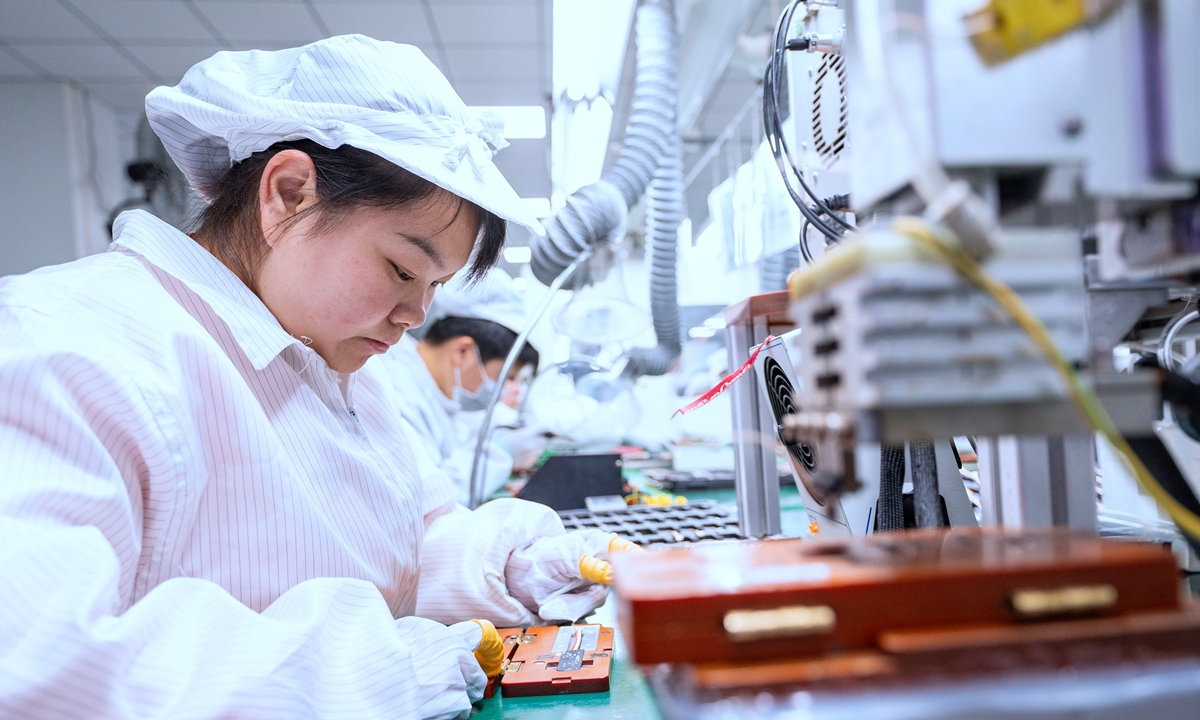
Workers make lithium battery products at an industrial park in Nantong, East China's Jiangsu Province, on December 11, 2023. Photo:VCG
China's Ministry of Industry and Information Technology (MIIT) on Wednesday issued draft rules for the country's lithium-ion battery industry, aiming to guide companies to reduce projects that aim solely to expand production and instead focus on technological innovation.
The proposals, which are open for public comment, are conducive to promoting the sound development of China's lithium-ion battery industry, which is increasingly gaining global prominence, and improve the sector's competitive edge amid rising competition and protectionism overseas, industry experts said.
The draft rules cover various aspects of the industry, including planning and new projects, technologies, performance, safety and quality, and environmental protection, according to the MIIT.
The ministry is seeking public comment for the draft rules through May 13. They aim to guide the industry to accelerate the transition and upgrading process and structural adjustment, so as to promote the sound development of the lithium-ion industry.
Notably, lithium-ion companies will be encouraged to reduce manufacturing projects that only seek to expand production capacity, and instead to strengthen technological innovation, improve quality and reduce production costs, according to the draft rules.
In an apparent bid to guide companies to bolster research and development (R&D), the draft rules require lithium-ion companies to spend at least 3 percent of the revenue from their main business on R&D and technological upgrades. They also set specific standards of energy density for various types of lithium-ion batteries.
The draft rules will help the lithium-ion industry to further gain a competitive edge globally, as Chinese companies have already achieved significant prominence worldwide, according to experts.
"The high-quality development of the lithium-ion battery industry toward a more regulated and standardized direction and the promotion of innovation at the technical level can help China's new-energy vehicles gain a more favorable competitive advantage in the global market," Wu Shuocheng, a veteran automobile analyst, told the Global Times on Wednesday.
Chinese new-energy vehicles (NEVs) have gained a competitive edge in terms of being "smart" and in batteries. Taking advantage of this situation to promote the high-quality development of the lithium-ion battery sector can ensure that the development of China's NEV sector will be more healthy, stable and sustainable, according to Wu.
Known as one of the "New Three" in China's top exports, lithium-ion battery exports have been surging rapidly. In 2023, such exports jumped by 33 percent year-on-year, according to official data.
Amid the rise of China's lithium-ion battery industry, US officials have been seeking to smear China's new energy sector by creating a narrative of overcapacity. However, Chinese experts said that the accusation is baseless and merely aimed at creating a pretext for potential protectionist measures.
"There is no basis for the overcapacity claim," Wu said, noting China's efforts to promote high-quality development in the industry and increased investment from foreign automakers in China.




